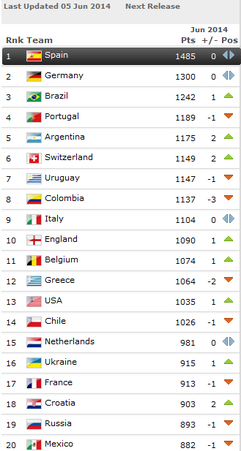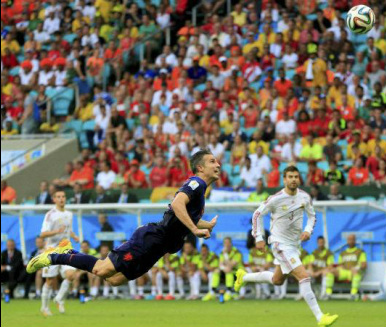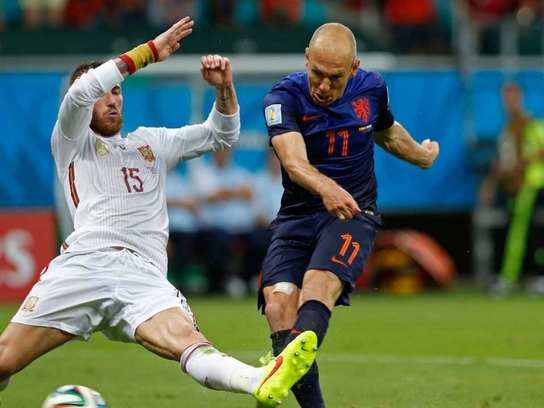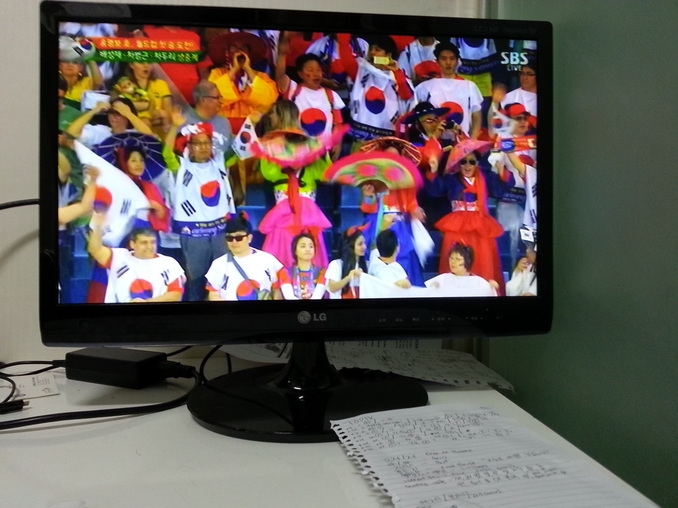“The World Cup is seriously negatively affecting my life!”
Political Influences on World Cup Results; Speculative
The appeal of the World Cup is definitely “political'” in the sense of it being all about national pride. Within Europe, I cannot help but think of the political situation since the 2008 Economic Crisis.
 FIFA Ranking Table, June 5th 2014
FIFA Ranking Table, June 5th 2014
The European “PIIGS”, who fast approach a decade of unending economic unpleasantness and pessimism, did remarkably poorly in the Group Stage:
Spain: Out. Two losses.
Italy: Out. Two losses.
Greece: Out. Two losses.
Porutgal: Probably Out. Nearly two losses (tied USA at last second).
Now, consider that Spain, Portugal, Italy, Greece respectively rank #1, #4, #9, #12 in the world!
“On paper”, as they say, each of these teams should be in the final 16, i.e., the second round in the World Cup. Three are out for sure and one teeters on the brink. What, then, is the statistical chance, in a 32-team tournament, that the #1, #4, #9, and #12 ranked teams are all eliminated before going onto the second round of 16 teams? The odds have to be very low, in which case we can speculate about a general explanation. Here is mine: As the contest is heavily influenced by national pride, teams from politically-pessimistic societies do more poorly than they should.
Vis-a-vis the “PIIGS”, who are more politically optimistic?
 Netherlands’ Robin Van Persie scores a “header” goal
Netherlands’ Robin Van Persie scores a “header” goal
With one glaring exception, Northwestern Europe has done very. Germany, Netherlands, Belgium, Switzerland, and England are all there. England was knocked out (and somewhere a dog was biting a man; England usually does poorly at the World Cup; England couldn’t even beat Costa Rica this time).
Germany: Probably advancing
Netherlands: Definitely advancing
Belgium: Definitely advancing
Switzerland: May advance with a final win
England: Out; scored only two goals in three games.
There is talk that certain of England’s potential players refused to play for the national team as they’d prefer a vacation, which points to a kind of cynical political pessimism and anti-patriotism, too.
I saw a surreal vieo-game-esque goal by Dutch star Van Persie, in Netherlands’ 5-1 win over Spain.
The South Korea team of 2014 performed poorly and will probably be eliminated. They have one Round One game left. I compare this to their great performance in 2002. The South Korea of 2002 was, in my opinion, much more politically optimistic than the South Korea of 2014.



As the Post is written rather off the cuff I will comment off the cuff too. There are 6 Blacks on the 23 person 2014 US Cup team. This is 26%. But these players are really dual citizens from Black GI’s and German mothers. Military presence? Coach is world famous German. Coincidence? Recruitment? There are 3 Spanish surnames, 13%. Not so far from the 17% US Hispanic population? Does this reflect something about society in general or player development or some sort of institutional bias? All of the above? Who knows? Complicated issues with no simple answers. Further, there are centuries of world migration and politics reflected in the Cup, no matter the country, and these reasonably reflect values and views of the populations. There are exceptions to mixing migration and team makeup of course: Japan and South Korea that show little migration. One thing is certain: High pay and High skill are involved.
“There are 3 Spanish surnames, 13%”
Counting by ancestry, 2.5 players are Hispanic:
[“Among the three Spanish-surnamed players, Omar Gonzales is of Mexican ancestry (and is 6’5″), Nick Rimando is half-Mexican, half-Filipino, and Alejandro Bedoya is descended from a couple of generations of Colombian soccer players.”]
This is only 10% of the team. As the USA is probably already over 20% Hispanic among 20-to-35-year-olds, and as Hispanics are so much more likely to play the game, this is surprising, isn’t it?
________________________________
Here is a Washington Post article complaining about the lack of Hispanics on the USA Team
http://tinyurl.com/mcqxoux
Article: “Why are there so few Latinos on the U.S. soccer team?” (6/14)
[“That Latinos are missing from the USMNT is not a new phenomenon. In 1994, when the United States hosted the World Cup, there were five Latinos on the USMNT. In 2006, there were three and in 2010 there were four. Now we are back to three in 2014 (Alejandro Bedoya, Nick Rimando and Omar Gonzalez), a paltry number given the interest, talent and raw numbers available.”]
One comment: When you say pessimism, do you really mean economic? I expect a country could be highly non-pessimistic and yet be crap in the Cup.
My point is that the “PIIGS” performed much more poorly than they should’ve given their international rankings as calculated a few weeks ago. Why?
How do we explain why Portgual, Italy, and Spain, all top ten ranked teams, were so easily knocked out? (Greece, it turns out, squeaked through with a last minute goal, so went through by fluke).
“Cultural pessimism” may drag down performance and “cultural optimism” may lift it. It’s not about a super-confident Andorra defeating a pessimistic Brazil. It’s about team play being affected by domsetic political mood.
This is not so different from the well-known and easily-verifiable positive effect that “home soil” has on World Cup team performance. The USA’s best result ever remains 1994, I think, when it hosted. France won in 1998 when it hosted. South Korea did its best ever in 2002 when it hosted. Germany won in 1990, nine months after the fall of the Berlin Wall.
Spain, Italy, Portugal, and Greece are all stuck in endless Great-Depression-style economic problems. Spain has had negative GDP growth for the past six years, and is still stuck with 25%+ unemployment, along with (I always hear) 50% unemployment for under-30s. Most of these players are under 30. This is a dark political mood to come out of.